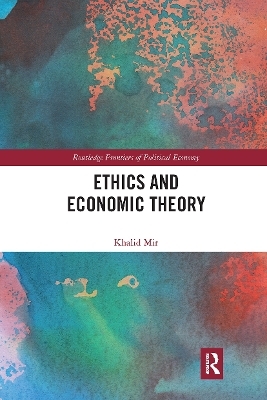
Ethics and Economic Theory
Seiten
2020
Routledge (Verlag)
978-0-367-50435-9 (ISBN)
Routledge (Verlag)
978-0-367-50435-9 (ISBN)
This book takes a multi-disciplinary critique of the fundamental and inter-related structuring assumptions that underlie the neo-classical paradigm. It provides insight into understanding human motivations and human flourishing and how a good economy requires reflection on the ethical relations between the self, world, and time.
This book takes a multi-disciplinary critique of economics’ first principles: the fundamental and inter-related structuring assumptions that underlie the neo-classical paradigm. These assumptions, that economic agents are rational, self-interested individuals, continue to influence the teaching of economics, research agendas and policy analyses. The book argues that both the theoretical understanding of the economy and the actual working of real-world market economies diminish the scope for thinking about the relation between ethics, economics, and the economy. It highlights how market economies may "crowd out" ethical behavior and our evaluation of them elides ethical reflection.
The book calls for a more pluralistic and richer approach to economic theory, one that allows ample room for ethical considerations. It provides insight into understanding human motivations and human flourishing and how a good economy requires reflection on the ethical relations between the self, world, and time.
This book takes a multi-disciplinary critique of economics’ first principles: the fundamental and inter-related structuring assumptions that underlie the neo-classical paradigm. These assumptions, that economic agents are rational, self-interested individuals, continue to influence the teaching of economics, research agendas and policy analyses. The book argues that both the theoretical understanding of the economy and the actual working of real-world market economies diminish the scope for thinking about the relation between ethics, economics, and the economy. It highlights how market economies may "crowd out" ethical behavior and our evaluation of them elides ethical reflection.
The book calls for a more pluralistic and richer approach to economic theory, one that allows ample room for ethical considerations. It provides insight into understanding human motivations and human flourishing and how a good economy requires reflection on the ethical relations between the self, world, and time.
Khalid Mir is Associate Professor at the Department of Economics at Lahore University of Management Sciences (LUMS). He received his PhD from The University of Essex with a focus on child labour. He has an MSc from The London School of Economics and Political Science. His current interests lie in the relation between ethics, economics, and the environment.
Introduction 1. Needs and Scarcity 2. Rationality and Economic Theory 3. The Ethical Limits of Markets 4. Individualism and the Self 5. Motivations: Self-interest, Sympathy and Commitment 6. An Unequal World 7. Do Markets Crowd Out Ethics? 8. Climate Change and Ethics 9. Time and Economics 10. Civil Economy: Re-imagining an Ethical Economy
| Erscheinungsdatum | 03.04.2020 |
|---|---|
| Reihe/Serie | Routledge Frontiers of Political Economy |
| Verlagsort | London |
| Sprache | englisch |
| Maße | 156 x 234 mm |
| Gewicht | 453 g |
| Themenwelt | Geisteswissenschaften ► Philosophie ► Ethik |
| Wirtschaft ► Allgemeines / Lexika | |
| Wirtschaft ► Volkswirtschaftslehre | |
| ISBN-10 | 0-367-50435-9 / 0367504359 |
| ISBN-13 | 978-0-367-50435-9 / 9780367504359 |
| Zustand | Neuware |
| Informationen gemäß Produktsicherheitsverordnung (GPSR) | |
| Haben Sie eine Frage zum Produkt? |
Mehr entdecken
aus dem Bereich
aus dem Bereich


